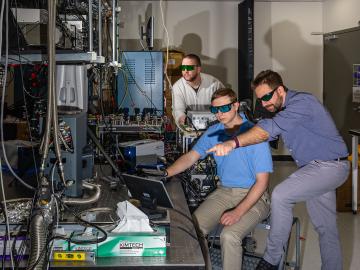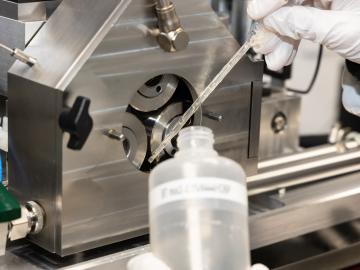
Filter News
Area of Research
- Advanced Manufacturing (5)
- Biological Systems (1)
- Biology and Environment (87)
- Biology and Soft Matter (1)
- Clean Energy (87)
- Climate and Environmental Systems (1)
- Computational Biology (1)
- Computer Science (1)
- Electricity and Smart Grid (1)
- Functional Materials for Energy (2)
- Fusion and Fission (7)
- Isotopes (1)
- Materials (37)
- Materials for Computing (5)
- National Security (10)
- Neutron Science (12)
- Nuclear Science and Technology (4)
- Quantum information Science (1)
- Supercomputing (55)
News Type
News Topics
- (-) 3-D Printing/Advanced Manufacturing (59)
- (-) Bioenergy (57)
- (-) Composites (12)
- (-) Energy Storage (44)
- (-) Environment (118)
- (-) Frontier (28)
- (-) High-Performance Computing (56)
- (-) Hydropower (5)
- (-) Molten Salt (2)
- (-) Quantum Computing (23)
- Advanced Reactors (13)
- Artificial Intelligence (56)
- Big Data (31)
- Biology (66)
- Biomedical (33)
- Biotechnology (12)
- Buildings (25)
- Chemical Sciences (38)
- Clean Water (14)
- Climate Change (57)
- Computer Science (103)
- Coronavirus (21)
- Critical Materials (5)
- Cybersecurity (20)
- Decarbonization (49)
- Education (1)
- Emergency (2)
- Exascale Computing (29)
- Fossil Energy (4)
- Fusion (39)
- Grid (28)
- Irradiation (1)
- Isotopes (36)
- ITER (3)
- Machine Learning (24)
- Materials (74)
- Materials Science (66)
- Mathematics (7)
- Mercury (7)
- Microelectronics (2)
- Microscopy (28)
- Nanotechnology (28)
- National Security (48)
- Net Zero (9)
- Neutron Science (60)
- Nuclear Energy (69)
- Partnerships (25)
- Physics (36)
- Polymers (13)
- Quantum Science (34)
- Renewable Energy (1)
- Security (14)
- Simulation (36)
- Software (1)
- Space Exploration (13)
- Statistics (1)
- Summit (33)
- Sustainable Energy (55)
- Transformational Challenge Reactor (4)
- Transportation (37)
Media Contacts

A team of researchers including a member of the Quantum Science Center at ORNL has published a review paper on the state of the field of Majorana research. The paper primarily describes four major platforms that are capable of hosting these particles, as well as the progress made over the past decade in this area.

A team led by researchers at ORNL explored training strategies for one of the largest artificial intelligence models to date with help from the world’s fastest supercomputer. The findings could help guide training for a new generation of AI models for scientific research.

Joseph Chapman, a research scientist in quantum communications at ORNL, was given the Physical Review Applied Reviewer Excellence 2024 award for his work as a peer reviewer for the journal Physical Review Applied.

When scientists pushed the world’s fastest supercomputer to its limits, they found those limits stretched beyond even their biggest expectations. In the latest milestone, a team of engineers and scientists used Frontier to simulate a system of nearly half a trillion atoms — the largest system ever modeled and more than 400 times the size of the closest competition.

ORNL scientists are working on a project to engineer and develop a cryogenic ion trap apparatus to simulate quantum spin liquids, a key research area in materials science and neutron scattering studies.

To balance personal safety and research innovation, researchers at ORNL are employing a mathematical technique known as differential privacy to provide data privacy guarantees.

Scientists at the Department of Energy’s Oak Ridge National Laboratory have developed lubricant additives that protect both water turbine equipment and the surrounding environment.

Scientists at Oak Ridge National Laboratory and six other Department of Energy national laboratories have developed a United States-based perspective for achieving net-zero carbon emissions.

The U.S. Environmental Protection Agency has approved the registration and use of a renewable gasoline blendstock developed by Vertimass LLC and ORNL that can significantly reduce the emissions profile of vehicles when added to conventional fuels.
Simulations performed on the Summit supercomputer at ORNL are cutting through that time and expense by helping researchers digitally customize the ideal alloy.


